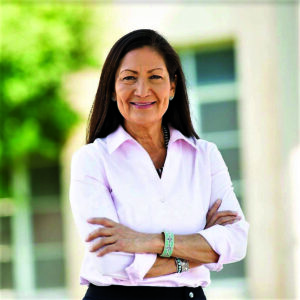Native lawmaker introduces ‘Broadband for All’
WASHINGTON – The Federal Communications Commission offer to give tribes complimentary licensing of broadband falls short of the incentive needed to provide equal access for Native and other rural constituencies, sponsors of the “Broadband for All Resolution of 2020” said in introducing the legislation to Congress on Sept. 23.
“Everyone in this country deserves access to reliable high-speed internet, especially during a pandemic, but I’ve heard from families in my district and across the country that internet is too expensive or completely unavailable to them and the FCC hasn’t taken the right steps to connect everyone no matter their background or where they live,” said Pueblo Indian U.S. Rep. Deb Haaland.
The resolution declares, “limiting access to broadband internet is a human rights violation.” It aims “to reaffirm basic civil and human rights protections so all people — especially low-income households, people of color, and those living in rural areas or on tribal lands — can access reliable broadband internet for basic daily activities,” according to its authors.
Haaland said it “will make sure kids don’t fall into the homework gap, workers can telework, families have access to telemedicine, and everyone can reach important information when they need it.”
A representative from New Mexico, Haaland is one of the first two Native American women elected to Congress. Sharice Davids of Kansas is the other.
California Rep. Ro Khanna, who joined Haaland to introduce the legislation, said internet access “should be a human right.” Despite the FCC’s mandate to increase broadband access, it has still failed to make it affordable, much less universal. That needs to change.”
The U.N. Human Rights Council passed a resolution in 2016 calling on countries to bridge the digital divide.
According to the authors of the Congressional bill, the U.N. action “raised global awareness that internet is not only a luxury, but a necessity that must be protected to defend freedom of expression, freedom of speech, and basic global human rights standards since technology has become a modern global necessity.”
They noted, “Internet blackouts have encumbered the ability of people to peacefully assemble and hampered efforts to bring transparency to crackdowns on protests in democratic countries across the world.”
The Federal Communications Commission received more than 400 applications from tribes and their entities during the Feb. 2 – Sept. 2 submission period for them to qualify as licensees of their own shares of the wireless spectrum.
When the agency announced on Sept. 15 that it had approved free licensing of 157 tribal government applications to take command of rural broadband internet services, it was just the beginning of challenges for licensees and others yet to be approved.
First, licensees must put their spectrum to use. Two years after the license is granted, licensees must submit evidence that they are providing service coverage to 50 percent of the population in their license area.
This FCC stipulation means that 50 percent of the population in the service area must be able to access the service; it does not require a 50 percent adoption rate.
Five years after the license is granted, licensees must show that they are providing service coverage to 80 percent of the population.
Licensees may lease their spectrum, and the service provided by a lessee will be counted towards the buildout requirement.
The “Broadband for All Resolution of 2020” seeks to smooth the way for applicants by calling on the President of the United States to:
- Protect sovereignty rights and treaty obligations by ensuring tribes have full and permanent access to electromagnetic spectrum over their lands to deploy broadband internet services.
- Build upon balanced technological leadership in the federal government and provide funding opportunities for all Americans to have equal access to broadband internet, especially for people of color, low-income families, and those living in rural or remote areas.
- Increase opportunities for infrastructure development for those left behind in the digital divide.
The resolution:
- Recognizes equal access to broadband internet for all Americans as a civil and human right.
- Asserts that access to broadband internet enables participation in the democratic process, equal access to information and education, government services, freedom of expression, freedom to peacefully assemble, and other civil liberties.
- Recognizes access to broadband internet protects exercise of constitutionally vested rights and equal engagement in American democratic process.
- Acknowledges that limiting access broadband internet is a human rights violation, only to be withheld, limited, or restricted through narrowly tailored laws.
(Contact Talli Nauman at talli.nauman@gmail.com)
The post Native lawmaker introduces ‘Broadband for All’ first appeared on Native Sun News Today.

